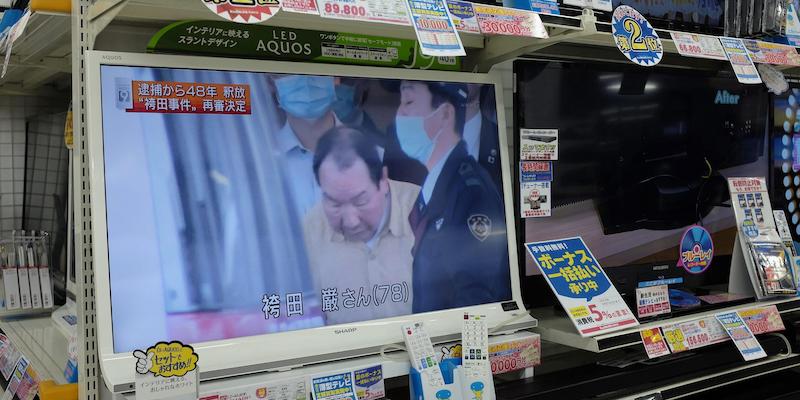The Tokyo High Court on Monday ruled that there will be a new trial in the case of Iwao Hakamada, an 87-year-old Japanese man first sentenced to death in 1968 and then finally in 1980. Hakamada was convicted of quadruple murder occurred in 1966, but almost immediately he declared himself innocent: the Court’s decision comes more than fifty years after his first conviction, after various appeals and above all after Hakamada had spent 35 years on death row, expecting from day to day ‘other than being able to be killed.
Until a few years ago Hakamada was considered the longest prisoner in the world waiting for the execution of his death sentence, considering the 1968 sentence as the beginning of his detention. His story is held up as an example of the flawed justice system in Japan, and news of the retrial raises the possibility that he will be acquitted after decades of what many believe was an unfair conviction. “I’ve been waiting for this day for 57 years and it’s finally here,” he said outside the courthouse Hakamada’s sister, Hideko.
Hakamada was found guilty of murdering his then boss’s entire family: on June 30, 1966, a Shizuoka factory manager, his wife, and their two children were stabbed before their house was set on fire. As he wrote il Japan Timesthe key elements in the reopening of the case are some bloodstains found on five garments found more than a year later in a tank of miso (a fermented soy-based condiment) in the factory.
A former boxer, divorced, Hakamada immediately attracted the attention of the police, who released him after an initial interrogation, finding no evidence or possible motives. A month later, however, the investigators arrested him again on the basis of some traces of petrol and blood found on his pajamas. Initially the man denied all the charges: however, he admitted to having killed the family after 20 days of pre-trial detention and daily interrogations which, according to the complaints of his lawyers and some NGOs, had lasted even 15 hours in line, and without the presence of lawyers, not required by law.
Despite the confession, during the first trial in November 1966 Hakamada pleaded not guilty to the murders, which the police had attributed first to an alleged affair he had with the wife of the company executive, and then to an attempted theft of money ( 80,000 yen at the time, the equivalent of around 2,300 euros today). In August 1967, 14 months after the murder, the bloody clothes were later found in the miso tank, which the prosecution believed to be his. Hakamada was sentenced to death in September 1968 despite the allegations being full of inconsistencies, and with no other people ever being investigated.
The sentence was ratified in the second instance by the Tokyo High Court and finally by the Supreme Court in 1980. Immediately after the final sentence, Hakamada was transferred to death row, where he remained for about 35 years, until 2014.
According to the prosecution, the clothes found in the miso tank in 1967 belonged to the person who killed the family: however, Hakamada’s lawyers believe that this evidence is not reliable. The Japanese prosecutor said the bloodstains on the clothes were dark red, but the defense believes that after being immersed in the tank for over a year, they would have come out discolored. Furthermore, some of these clothes were smaller than the size worn by Hakamada: the prosecution said, however, that they had shrunk precisely because they were immersed in the liquid in the tank.
– Read also: Thirty-five years on death row
Immediately after the final conviction, Hakamata began the legal battle to obtain a new trial, claiming that he had been tortured and forced to sign a confession. Gradually, in the 2000s, his case began to attract attention outside Japan as well. In 2008, his lawyers obtained that the blood present on the clothing found in the tank be subjected to a DNA test: the blood was found to be incompatible with both that of the convict and that of the victims, and in 2014 Hakamada was released from prison pending a new trial, after nearly fifty years of detention and 35 spent on death row.
In 2018, however, the Tokyo High Court declared the DNA test inadmissible and the case ended up in the Supreme Court of Japan, which accepted the defense’s appeal in 2020: the Supreme Court thus remanded the case to the Tokyo High Court, inviting her to consider whether the death penalty should be considered valid, and therefore enforceable, or whether to celebrate a new trial, as she finally established on Monday.
The case of Hakamada is considered an example of how difficult it is to try to reopen a trial or overturn convictions deemed unjust in Japan, a country with a very low crime rate and a conviction rate close to 99 percent. Generally in Japan almost only cases are brought to court in which the culprit is quite clear: the cultural habit of considering the defendants almost certainly guilty, moreover, causes enormous distortions in the national judicial system, which moreover provides that the execution of the sentence death can occur even with a few hours’ notice.
In short, for decades for Hakamada every day could have been the last, which in all probability contributed to the deterioration of his condition.
Today Hakamada is 87 years old and suffers from mental problems caused by a solitary detention that lasted for almost half a century. He is no longer able to express himself nor does he seem to understand where he is, and lives with his ninety-year-old sister Hideko. Given his health condition, he had been allowed to await the verdict of the High Court in freedom.
– Read also: One of the longest wrongful convictions in American history
